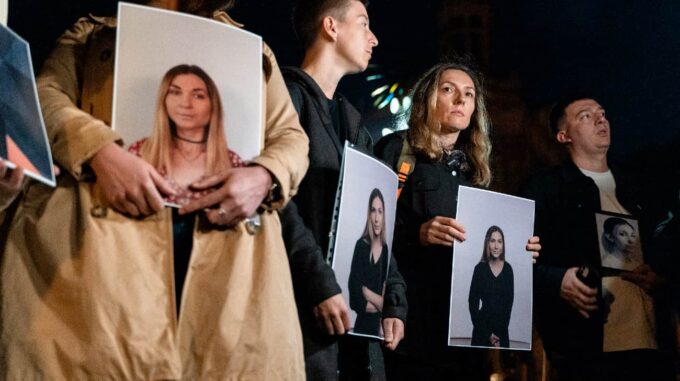Hunger, isolation, and disrupted exchange: the tragic fate of Ukrainian journalist Victoria Roshina in a Russian detention center

Last year, Ukrainian journalist Victoria Roshina became a victim of Russian repressive policies, and her fate remains uncertain to this day. Details of her detention in Taganrog Investigation Isolator No. 2 tell a story of treacherous isolation, torture, and resignation to a fate deliberately imposed by Russian authorities. Journalists and official sources are revealing new aspects of her harsh captivity, which has been ongoing for over a year. This is not only a story about an individual but also about the widespread efforts of the Russian system to maintain its repressive regime and discredit Ukrainian citizens. According to obtained information, at the end of January 2024, Victoria, along with other Ukrainian prisoners, was transferred to an isolator in Taganrog. The journalist’s father, Volodymyr Roshyn, did not remain silent and appealed to the International Committee of the Red Cross, urging access to his daughter. However, they were unable to receive official confirmation of her whereabouts and condition. It is known that the international humanitarian organization confirmed her detention in a Russian SIZO but was unable to see her in person due to access restrictions. A few months later, in May 2024, one of the released Ukrainian prisoners reported to the press that he recognized Victoria visually in the corridors of the Taganrog isolator. According to him, her health was in critical condition — she appeared extremely exhausted, and her body could no longer withstand prolonged hunger and abuse. It is known that the food in the isolator was very minimal — she was fed rotten potatoes, which led to a rapid deterioration of her physical state, causing excessive weight loss and pathological symptoms. Witnesses reported that in response to physical exhaustion, active measures began in the cells to force-feed her. Guards exerted significant efforts to compel Roshina to eat, but their attempts were unsuccessful. In August 2024, her father says, Victoria was urgently hospitalized — she had experienced critical exhaustion and dehydration. After treatment that lasted several days, she was returned to the Taganrog isolator, but not to the general ward — she was moved to a solitary cell. This marked a new level of isolation and psychological pressure. Regarding the current situation, one former prisoner stated that at the time of her return from the hospital, Victoria had a catheter inserted, and she was being prepared with specialized nutrition adapted to her physical condition. The prison administration sought to control every aspect of her treatment, asking other inmates what she should receive for food. This indicates attempts by Russian officials to monitor her health while effectively keeping her in isolation and depriving her of the ability to fight for her own survival. For a time, it seemed that the situation might change — in August 2024, Victoria’s father received a phone call from her. During the conversation, she reported that she was still being held in a high-security mode and that the Ukrainian side had supposedly arranged for her release as part of a future exchange. She pleaded with him to stop her hunger strike and to agree to the promise of release, which he did. However, despite all efforts, the planned exchange was never carried out — Russia kept Victoria in their hands. On September 8, 2024 — the day scheduled for the exchange — Victoria was taken out of her cell in preparation for her return. According to one eyewitness, the same Ukrainian woman was brought to the exit of the investigator’s isolator but suddenly, without warning, she was returned back. At the same time, an informant reported that Victoria tried to help prison staff understand the situation and to exit the detention area with the assistance of another inmate. Witnesses saw her being led out of the cell, but soon a guard appeared and announced that she did not make it onto the exchange list. According to him, the reason was her personal responsibility for non-compliance with the plans. This story further underscores how complex and dramatic Victoria Roshina’s fate is — a person who took risks and fought for the rights of others, yet remains in Russian captivity with an uncertain future. Her story is a poignant reminder of how brutal and lawless the situation with Ukrainian citizens detained and held hostage by Russia has become. In conclusion, the true condition and fate of Victoria Roshina remain unknown, and her detention in a Russian SIZO exemplifies systemic injustice and abuse. Independent experts and her family continue to demand access to her to ascertain her current state and to focus on her swift return home. This tragic story is ongoing, and the whole world is watching its development.

